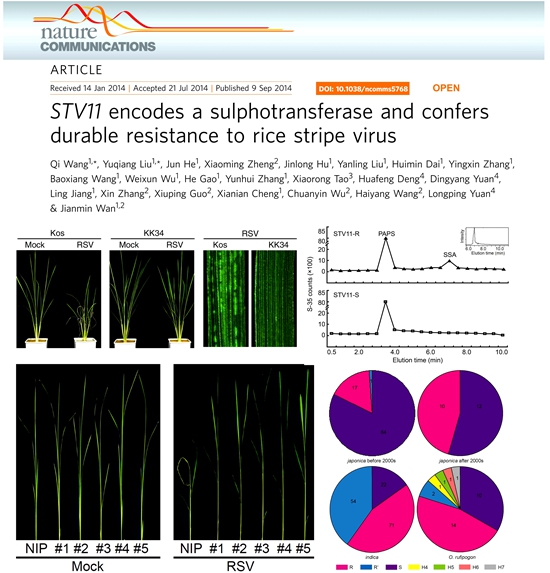分享到
Chinese scientists clone resistant allele of rice STV11
A team of Chinese scientists led by Dr. Wan Jianmin from the Institute of Crop Sciences (ICS) of Chinese Academy of Agricultural Sciences (CAAS) successfully cloned the resistant allele of rice STV11 (STV11-R) and bred a series of high-yield and high-quality rice cultivars with rice stripe virus (RSV) resistance. Their findings are published in Nature Communications, an online scientific journal, on September 10th, 2014.


The study shows that STV11, which confers durable resistance to RSV, encodes a sulfotransferase catalysing the conversion of salicylic acid (SA) into sulphonated SA (SSA), leading to increased SA accumulation in the RSV-infected plants and inhibition of viral replication.
In its research, the team developed a technical system for identification of RSV-resistance, and bred resistant cultivars against RSV by studying rice germplasm, gene sequence and gene discovery. The development of resistant rice cultivars is recognized as an effective solution to RSV control in rice production, particularly in Japonica rice production.
The findings also suggest effective methods for breeding pest/disease-resistant rice cultivars by using molecular marker technology, and shed new insights into plant viral defense mechanisms.
RSV causes one of the most serious viral diseases of rice (Oryza sativaL.). In severe cases, it can cause complete failure in rice production. Up to 80% of the rice fields in Eastern China, Japan and the Republic of Korea were affected by this disease. Therefore, the research findings are of great significance to tackling the RSV challenge in Japonica rice producing areas in southern China.
In its research, the team developed a technical system for identification of RSV-resistance, and bred resistant cultivars against RSV by studying rice germplasm, gene sequence and gene discovery. The development of resistant rice cultivars is recognized as an effective solution to RSV control in rice production, particularly in Japonica rice production.
The findings also suggest effective methods for breeding pest/disease-resistant rice cultivars by using molecular marker technology, and shed new insights into plant viral defense mechanisms.
RSV causes one of the most serious viral diseases of rice (Oryza sativaL.). In severe cases, it can cause complete failure in rice production. Up to 80% of the rice fields in Eastern China, Japan and the Republic of Korea were affected by this disease. Therefore, the research findings are of great significance to tackling the RSV challenge in Japonica rice producing areas in southern China.
By Xing Lili
xinglili@caas.cn
xinglili@caas.cn
Latest News
-
 Apr 18, 2024Opening Ceremony of the Training Workshop on Wheat Head Scab Resistance Breeding and Pest Control in Africa Held in CAAS
Apr 18, 2024Opening Ceremony of the Training Workshop on Wheat Head Scab Resistance Breeding and Pest Control in Africa Held in CAAS -
 Apr 03, 2024IPPCAAS Co-organized the Training Workshop on Management and Application of Biopesticides in Nepal
Apr 03, 2024IPPCAAS Co-organized the Training Workshop on Management and Application of Biopesticides in Nepal -
 Mar 28, 2024Delegation from the School of Agriculture and Food Science of University College Dublin, Ireland Visit to IAS, CAAS
Mar 28, 2024Delegation from the School of Agriculture and Food Science of University College Dublin, Ireland Visit to IAS, CAAS -
 Mar 25, 2024Director of World Food Prize Foundation visited GSCAAS
Mar 25, 2024Director of World Food Prize Foundation visited GSCAAS -
 Mar 20, 2024Institute of Crop Sciences (ICS) and Syngenta Group Global Seeds Advance Collaborative Research in the Seed Industry
Mar 20, 2024Institute of Crop Sciences (ICS) and Syngenta Group Global Seeds Advance Collaborative Research in the Seed Industry
